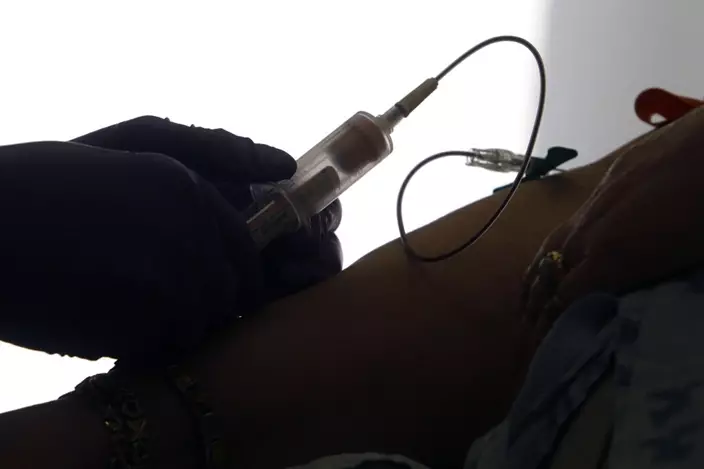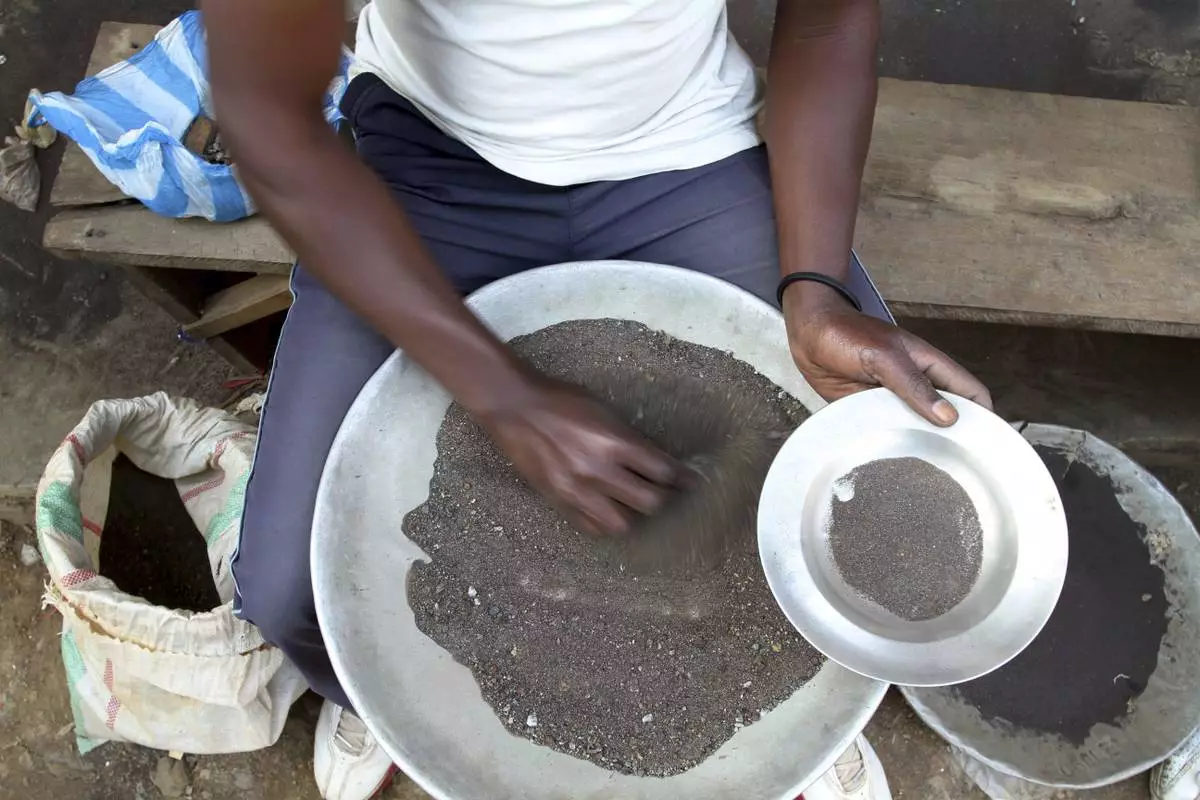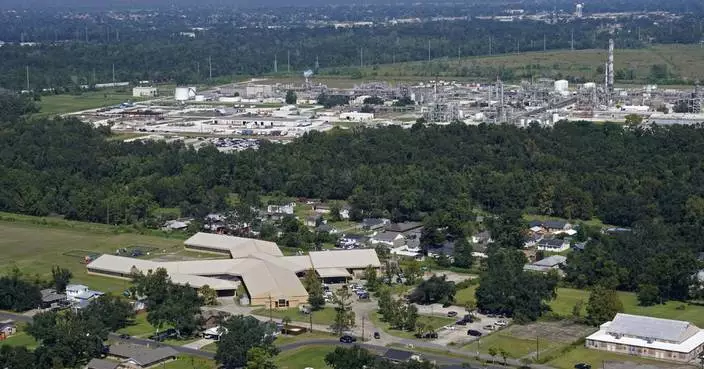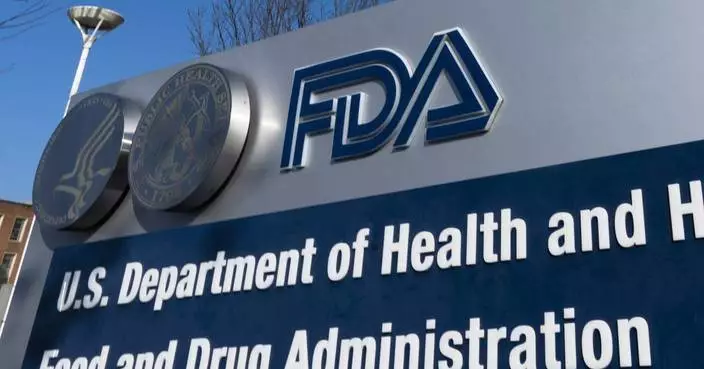A blood test five years after breast cancer treatment helped identify some women who were more likely to relapse, long before a lump or other signs appeared, a preliminary study found.
It was the largest experiment so far to use these tests, called liquid biopsies , for breast cancer. Results suggest they someday may help reveal which women need longer preventive therapy and which ones can be spared it.

FILE - In this Tuesday, April 28, 2015 file photo, a patient has her blood drawn for a liquid biopsy at a hospital in Philadelphia. A study released on Friday, Dec. 8, 2017 found that a blood test five years after breast cancer treatment helped identify women who were likely to relapse, long before a lump or other signs appeared. (AP Photo/Jacqueline Larma)
"It could be providing an early warning sign" for some women that cancer is returning, said Dr. Joseph Sparano of Montefiore Einstein Center for Cancer Care in New York.
On the other hand, "if you had a negative test, there was a 98 percent chance you would not have a recurrence in the next two years" and perhaps could skip further treatment, he said.
Sparano led the study and gave results Friday at the San Antonio Breast Cancer Symposium.
The test — CellSearch, sold by Menarini-Silicon Biosystems — looks for stray cancer cells in the blood.
Breast cancer survivors may be tempted to rush out and get it, but doctors say it's too soon for that. Although it's been used for about a decade to monitor certain patients with advanced cancer during treatment, its value for helping to predict breast cancer relapse risk is not well established, and insurers won't pay the $600 to $900 tab.
The new study should spur more research on this right away, said Dr. Massimo Cristofanilli, a breast cancer specialist at Northwestern University in Chicago who has used these tests and consults for another company developing one.
"Clearly, to me, we have to do something" now that this study suggests a wider role for them, he said.
It involved 547 women in long-term follow-up from an earlier cancer drug study. Two-thirds of them had cancers fueled by estrogen, and in most cases it had spread to lymph nodes but not more widely.
All had surgery and chemotherapy followed by hormone-blocking medicines for five years. Guidelines now recommend considering hormone blockers for up to 10 years, but they have side effects and their benefit beyond five years is fairly small. So finding a way to tell who really needs that would be a big help.
Women in the study had a CellSearch test five years on average after their cancer was found and treated.
Among those with estrogen-fueled disease, 5 percent had cancer cells in the blood test, and they turned out to have a 22-fold higher risk of recurrence within roughly two years compared to women whose blood test was negative.
About 65 percent of women with hormone-positive disease and a positive blood test did not have a new breast cancer within two years, but that doesn't mean the blood test gave a false alarm, Sparano said.
"We haven't followed the patients long enough" — it could be that more tumors become evident with more time, he said.
The blood test seemed to do a good job of identifying which of these hormone-positive patients were at low risk of recurrence, suggesting that women who test negative may be able to forgo an additional five years of hormone-blocking medicines.
The test did not predict recurrence risk in the rest of the women in the study, whose tumors were not fueled by estrogen. They have a lower risk of recurrence after five years to start with.
The study was funded by the Breast Cancer Research Foundation, Susan G. Komen Foundation and the National Cancer Institute.
CAPE TOWN, South Africa (AP) — Congo ’s government is questioning Apple about the tech company’s knowledge of “blood minerals” from a conflict zone in the African country that could be smuggled into its supply chains and is demanding answers within three weeks.
A group of international lawyers representing Congo said Thursday that they sent letters to Apple’s CEO Tim Cook and its French subsidiary this week, raising concerns about human rights violations involving the minerals extracted from mines in the country’s troubled east that might end up being used in the company’s products.
They included a list of questions challenging Apple to show how it monitors its supply chains in a region where more than 100 armed rebel groups operate, some of whom have been accused of carrying out mass killings of civilians.
Writing to Cook, the lawyers said “it has become clear to us that year after year, Apple has sold technology made with minerals sourced from a region whose population is being devastated by grave violations of human rights.”
"The iPhones, Mac computers and accessories that Apple sells to its customers around the world rely on supply chains that are too opaque, and that are tainted by the blood of the Congolese people," the lawyers said.
Eastern Congo is one of the most mineral-rich regions in the world but is also the site of a huge humanitarian disaster, with the armed groups fighting for years for control of the mines and the valuable minerals in them, and millions of people displaced and affected by the worsening violence. The situation has deteriorated badly in the last few months.
Apple’s press representatives in Europe didn’t respond to a request for comment.
Apple, which has a market value of around $2.6 trillion, has denied using minerals from mines and regions where human rights violations take place and says it conducts business ethically. It said in a 2023 report that it “responsibly” sources minerals in Congo and its neighboring countries.
The minerals it buys don't finance war or armed groups, it says. The lawyers for the Congo government said “those claims do not appear to be based on concrete, verifiable evidence.”
The Congo government said it has suspicions that some of the tin, tungsten, tantalum and gold — known as the 3TG critical minerals — that Apple sources from suppliers is smuggled out of Congo to neighboring Rwanda and then infiltrated into the global supply chain. The 3TG minerals are key components in electronics.
“In Congo, people have been dying for 30 years as a result of illegal mining,” Congo government spokesperson Patrick Muyaya said. “We want clarification on the sources of supply for major technology companies, in particular Apple, to verify whether they are acquiring minerals produced in completely illegal conditions.”
He said Rwanda “is presented” as the supplier for many of the minerals while having few reserves of its own.
Congo has accused Rwanda of financing and directing the notorious armed rebel group M23 in eastern Congo to help extract minerals illegally. The United Nations also says M23 is backed by Rwanda.
Rwanda denies that but tensions between the countries are increasingly high, while M23 and other groups are accused of regularly carrying out attacks that include the killing and raping of civilians, according to Human Rights Watch.
The lawyers for the Congo government quoted a 2022 report by the nongovernmental organization Global Witness that claimed Apple had previously applied “few meaningful mitigation measures” to avoid using smuggled minerals.
The Congo government was now seeking “effective redress” against “end-users of blood minerals” across the world, the lawyers said.
They asked Apple to respond to questions over its supply chain controls within three weeks and said they had compiled a report on “the laundering” of Congo's minerals by Rwanda and private entities that would be made public this month.
They also would seek instructions from the Congo government as to what legal measures it is considering against Apple, the letter said.
AP Business Writer Kelvin Chan in London and AP writer Saleh Mwanamilongo in Kinshasa, Congo, contributed to this report.
AP Africa news: https://apnews.com/hub/africa

FILE - A Congolese miner sifts through ground rocks to separate out the cassiterite, the main ore that's processed into tin, in the town of Nyabibwe, eastern Congo, Aug. 16, 2012. Congo’s government is questioning Apple about the tech company’s knowledge of “blood minerals” from a conflict zone in the African country that could be smuggled into supply chains. A group of international lawyers representing Congo said Thursday, April 25, 2024, that it sent letters to Apple’s CEO Tim Cook and its French subsidiary this week raising concerns about human rights violations involving the minerals extracted from mines in the country’s war-torn east. (AP Photo/Marc Hofer, File)










